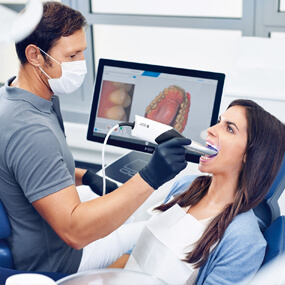Why You Should Replace Missing Teeth

Your oral health can affect your total health—body, and mind. In fact, there is a correlation between poor dental health and overall health issues. A missing tooth changes your bite and your speech, and it influences your diet choices. These adjustments to your lifestyle can cause nutritional, social, and even psychological problems. People with missing teeth are more likely to suffer from headaches and jaw pain. Worse yet, having a tooth missing puts a greater strain on the remaining teeth. That means more wear and tear that requires dental care lest you lose even more teeth.
Missing teeth can also cause bone deterioration. The jaw—no longer supporting a tooth—deteriorates in those areas, and you can lose as much as 25 percent of your supporting jawbone within the first 12 months after tooth loss. There is good news, however. There are implants and other options that can take the place of your natural teeth. These not only improve your appearance but help to preserve your jaw. Your dentist can help you determine which options are available to you and help you choose.
Your Options to Replace Missing Teeth
There are various tooth replacement options available, and it is important to note your unique circumstances to determine whether you are an ideal candidate for any particular one. Your dentist will perform a comprehensive examination, including X-rays of your jaw, in order to determine which options are appropriate. Dental implants are usually suitable for everyone regardless of age and are arguably the best option, but they are also among the most expensive cosmetic dental treatments.
- Fixed Bridge – A dental bridge is a false tooth—also called a pontic—that bridges the gap between teeth. Often, this is accomplished by cementing the pontic to the existing natural teeth. There are bridge options, even when the gap is wider than a single tooth. Bridges may be more economical than implants and can last even 15 years or so, but an implant is certainly the more permanent solution.
- Partial Denture – A partial denture is removable and a lot like a retainer in the way it replaces teeth. Generally made with acrylic and/or metal, a partial is held in place with clasps or wires. Metal wires may be visible and can cause long-term damage. Partial dentures must be removed to clean beneath them, and they must be soaked in an appropriate solution overnight to keep them moist and clean.
- Full Denture – A complete denture is similar, but it replaces all the teeth on either the upper or lower jaw, and some people have a full set for both the top and bottom. Dentures are an effective option to which many people acclimate well, but others find them uncomfortable and even to the point of being intolerable. Like partials, full dentures must be removed to clean beneath them, and you must soak them overnight in order to keep them moist, kill bacteria and keep the prosthetic from discoloring. As your jaw shrinks over time, it may be necessary to replace the dentures in order to achieve a proper fit.
- Dental Implants – Modern dental implants are more comfortable than dentures, and they are certainly the most enduring solution. Implants provide a strong foundation to keep the jawbone and nearby teeth healthy. Implants are used to secure crowns as well as bridgework and dentures. However, unlike with bridges and partial dentures, there is no damage to the surrounding teeth. With proper care, implants can last a lifetime, and they are stable, comfortable, and attractive for almost any patient regardless of the circumstances.
Should You Choose Implants Over Bridges and Dentures?
Implants are more expensive, and so there are practical aspects to consider, but cost aside, yes. Partial dentures and dental bridges can negatively affect the surrounding teeth. Full and partial dentures can become loose over time and feel downright uncomfortable. This can make chewing hard as well as make you self-conscious when speaking in public, and a nightly denture ritual can be a hassle.
Restore Your Smile
If you are missing a tooth or multiple teeth, Scottsdale Cosmetic Dentistry Excellence can help. Jeffrey D. Clark, DDS, is a leading cosmetic dentist in the Scottsdale region, and he can help you determine which treatment is best for you. In the event you choose dental implants, Dr. Clark collaborates with one of the leading dental implantology practitioners in Arizona—Dr. Joe Mehranfar. Call us at 480 585 1853 to schedule your consultation with Dr. Clark.




